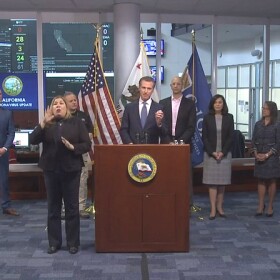New data from the Centers for Disease Control show it’s not just the elderly who are vulnerable to a severe case of COVID-19. Young people are at risk too.
The CDC looked at about 2,500 cases in the U.S. between Feb. 12–March 16 and found around 40% of those patients needing hospitalization were between the ages of 20 and 54.
While the risk of dying is much higher among patients 65 and older, the data shows younger people are still susceptible to severe cases of the illness, which is a sharp contrast to previous beliefs.
Dr. Eric Feigl-Ding, an epidemiologist and health economist at the Harvard Chan School of Public Health, says young people were never immune to the virus.
"Young people do get sick, but more importantly they are carriers and get infected just like everyone. And they carry it to more places. They often see way more people... than someone who is older in their homes or a nursing home," Ding said.
And young people can still get severe cases of coronavirus, he says, because the effects of the disease are not just based on age.
"It's not just age, but risk factors that you have. For example, cardiovascular risk factors, heart disease, strokes, diabetes, high blood pressure, kidney disease, and of course all your lung diseases like bronchitis, asthma... and of course if you're a smoker, which many young people are," he said.
In fact, CDC data show cigarette smoking tends to be highest among people aged 25–44 years and 45–64 years old.
"It's usually because of one of these, but there are stories of someone in their 20s and 30s who are hospitalized or in critical condition. That's worrisome, but we obviously don't know all the risk factors because the virus is just so new. But often times it is a combination of age and these wide-range risk factors," Ding said.

Kate Grusich, a spokeswoman for the CDC, says the data didn't look at whether the patients in the report had underlying health conditions. So that's a limitation of the study.
"COVID-19 is a new disease and we are learning more about it every day. Based on available information and clinical expertise, we believe that older adults and people of any age who have serious underlying health conditions may be at higher risk for more serious complications from COVID-19," Grusich wrote in an email to KPBS.
"Currently detailed data on serious underlying health conditions are not available."
However, new evidence that younger people are getting severe cases prompted WHO director Tedros Adhanom Ghebreyesus to issue a warning on Friday to young people who are failing to socially distance themselves.
"Data from many countries clearly show that people under 50 make up a significant portion of patients requiring hospitalization," Ghebreyesus said. "I have a message for young people, you’re not invincible, this virus could put you in the hospital for weeks, or even kill you."
The warning follows reports that many younger people are still attending crowded areas, like beaches.
“If I get corona, I get corona. At the end of the day, I'm not gonna let it stop me from partying”: Spring breakers are still flocking to Miami, despite coronavirus warnings. https://t.co/KoYKI8zNDH pic.twitter.com/rfPfea1LrC
— CBS News (@CBSNews) March 18, 2020
The latest numbers on testing in San Diego on March 19 shows that of the more than 100 people who tested positive, around two-thirds are under the age of 50.
And the latest census data shows the average San Diegan is around 35 years old.
The news comes just a day after California Gov. Gavin Newsom declared a "shelter-in-place" order for the state, encouraging the state's residents to take more serious steps to socially distance themselves.







